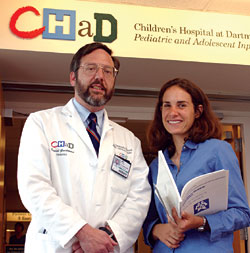Study shows that in pediatric residencies, size doesn't matter
At small pediatric residency programs, the diversity of inpatient educational opportunities is just as good as at larger, more urban programs, according to a DMS study published in the July 2003 issue of the Archives of Pediatrics and Adolescent Medicine. The lead author on the study was an undergraduate—Rebecca Jennings, DC '03. She examined illness severity and diagnostic diversity for inpatients at small, medium, and large pediatric residency programs.
"There's a general perception that larger pediatric programs are better just because they're larger, and urban centers offer more diverse patients and more severely ill patients than smaller programs," she says.

|
|
Dartmouth undergraduate Rebecca Jennings,
right, was the lead author on a recent study.
Pediatrician David Goodman, left, advised her. |
Lindsay Thompson, M.D., who just finished a postdoctoral fellowship at DMS, and David Goodman, M.D., an associate professor of pediatrics, were coauthors and guided Jennings through the research and publication process.
The study drew on a national sample of university- affiliated pediatric residencies. Jennings divided the programs into three sizes: small, medium, and large, based on number of residents. The researchers then used Diagnosis-Related Group weights—a standard means of measuring illness severity and complexity—to see if there was any relationship between inpatient illness severity and program size. They found there was no relationship at all.
"There's basically no difference between small, medium, and large programs if you look at the severity of medical admissions," says Thompson. Diagnostic severity for surgery patients was higher at larger programs, but this finding was not unexpected. Larger programs traditionally offer cardiac surgery, organ transplants, and other complex surgeries that are not available at smaller programs. But "high-level pediatric surgery is much less relevant [than medical pediatrics] in terms of the training of pediatricians," explains Goodman.
Team: Jennings and her team also looked at the diversity of illnesses across programs and found that larger programs actually had slightly less diversity than smaller programs. The published article shows the top five medical diagnoses for each type of residency program. Large programs had the highest percentage of discharges for their five most common diagnoses (29.9%); small programs had a lower percentage (24.9%) for their five top conditions, indicating more diversity of illness at those programs. Overall, a residency program's size was not a strong indicator of illness diversity. Patients with severe and diverse illnesses were present in both large and small residency programs.
Useful: The study could prove useful to smaller residencies, like DHMC's. "If you are thinking of specializing in pediatrics, you still can get a great education at a small program. . . . [It's] not necessarily inferior to a large program," says Jennings.
Before getting involved in the study, Jennings, a biology major who is interested in becoming a doctor, was shadowing Goodman once a week. He suggested the study to her and she took it on as a part-time job. "Rebecca absolutely earned her first authorship," he says. "It was a mentored research environment, and she definitely took the torch and ran with it."
For Jennings, learning about the publication process while still an undergraduate "was really rewarding." She was even selected to present her work at the Pediatric Academic Societies annual meeting in May 2003. "This is the single largest national pediatric research meeting each year," says Goodman. "Getting selected for an oral presentation is very competitive."
Matthew C. Wiencke
If you would like to offer any feedback about this article, we would welcome getting your comments at DartMed@Dartmouth.edu.
